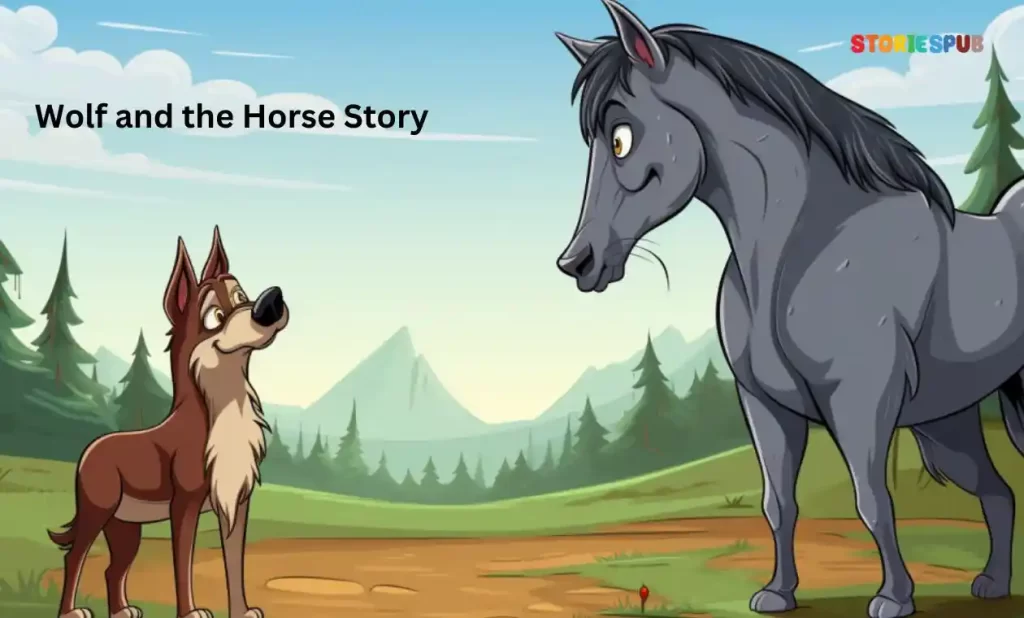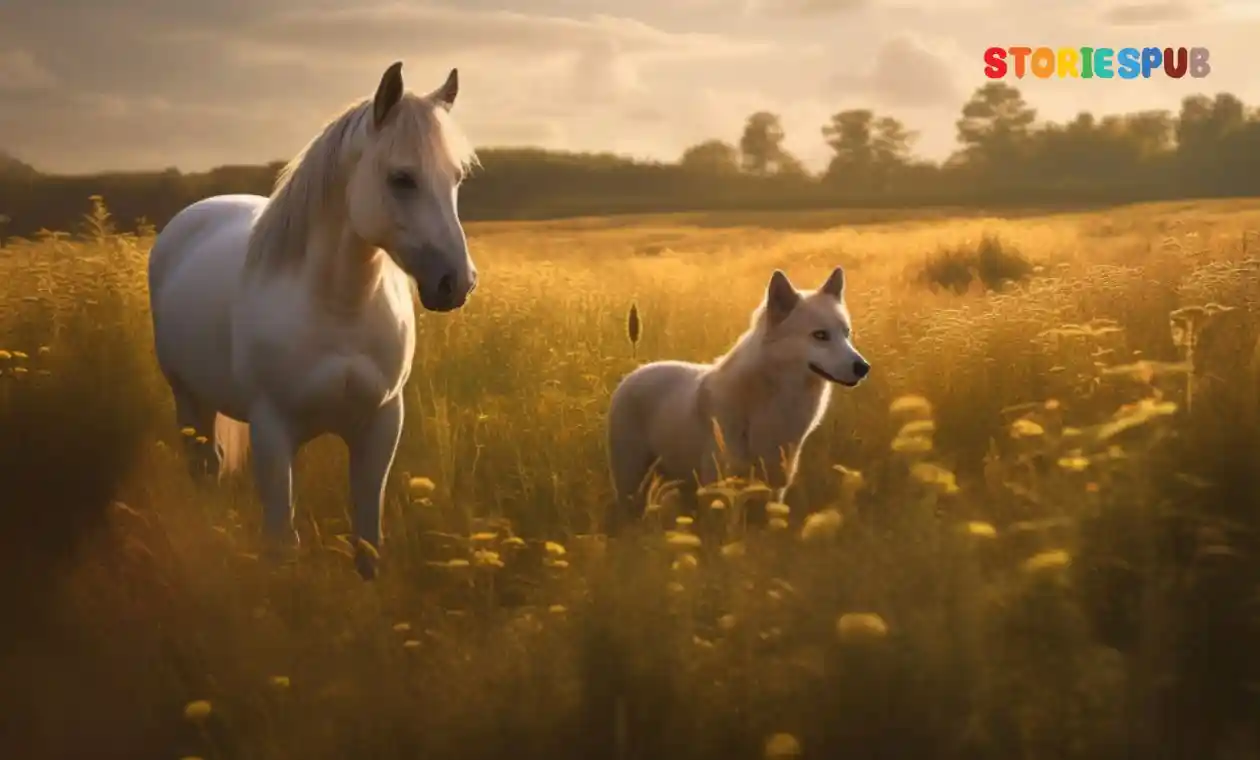
Once upon a time, in a peaceful meadow nestled between rolling hills, there lived a clever and curious wolf named Wily. Wily loved exploring new places and discovering hidden treasures. His golden fur glistened in the sunlight as he roamed freely, his eyes always on the lookout for adventure.
One bright and sunny morning, as Wily trotted along a familiar path, a delicious scent wafted through the air and tickled his sensitive nose. Following his instincts, he traced the tantalizing aroma to a nearby oat field. The sight that greeted him was a feast for his hungry eyes—a vast expanse of green, lush oats swaying gently in the breeze.
Wily’s stomach growled with anticipation as he stepped cautiously into the field. He longed to taste the sweet, nutritious oats and fill his belly. However, much to his dismay, his sharp teeth and jaws proved no match for the hard, outer shells of the oats. Try as he might, Wily couldn’t crack a single one open.
Frustration welled up within him, but the resilient wolf refused to give up easily. He tried biting, clawing, and even smashing the oats against rocks, but all his efforts were in vain. Exhausted and defeated, Wily slinked out of the field, his belly rumbling louder than ever.
As he wandered on, feeling sorry for himself, Wily’s path crossed with a majestic horse named Noble. Noble was a regal creature with a silky mane and a gentle demeanor. The horse was known for his wisdom and kindness, and his presence brought a sense of calm to the meadow.
Noble, with his keen eyes, noticed Wily’s glum expression and halted his grazing. “Greetings, my furry friend. Why do you wear such a crestfallen look?” he inquired, his voice as soothing as a summer breeze.
Wily’s ears perked up at the sound of Noble’s voice. Here was a chance to share his tale of woe with a sympathetic ear. “Oh, noble steed,” he began, his voice tinged with melancholy, “I stumbled upon a field filled with the most delectable oats. I had hoped to feast upon them, but alas, my teeth were not strong enough to crack their hard shells. I couldn’t bear the thought of such a treasure going to waste, so I saved them for you, dear horse. They are of exceptional quality!”
Noble listened intently, his kind eyes never leaving Wily’s face. When the wolf finished speaking, the horse’s lips curled into a gentle smile. “Dear Wily,” he began, his voice resonating with wisdom, “if you were capable of consuming those oats, I have no doubt that you would have been solely concerned with satisfying your own hunger. Sharing them with me wouldn’t have even crossed your mind. While your gesture appears noble on the surface, I cannot find it in my heart to say thank you. For you only offered the oats because they were useless to you.”
Wily’s ears drooped and his tail hung low. He realized that Noble had seen through his intentions, unveiling the truth behind his supposed generosity. Ashamed of his selfish motives, the wolf felt a pang of guilt wash over him.
The wise horse, sensing Wily’s remorse, approached him gently. “Fear not, my friend. For in this moment, you have learned a valuable lesson—one that will guide you through life’s twists and turns. True acts of kindness come from a place of selflessness, where one’s actions are not tainted by personal gain. It is not the external appearance of generosity that matters, but the purity of intent behind it.”
Wily nodded, his eyes glimmering with newfound understanding
. From that day forward, the wolf approached life with a changed perspective. He vowed to be more genuine in his actions, to let go of selfish desires, and to embrace the true essence of kindness.
And so, Wily and Noble continued their lives in the meadow, each wiser in their own way. Wily, having learned the importance of sincerity, took great care to distinguish between true generosity and mere pretense. He forged genuine connections with the creatures of the meadow, always offering a helping paw without expecting anything in return.
As for Noble, his wisdom continued to inspire those around him. He shared the tale of Wily and the oat field with other animals, teaching them to see beyond appearances and to recognize the sincerity of genuine acts of kindness.
The story of “The Wolf and the Horse” was passed down through generations, reminding all who heard it of the power of honesty, empathy, and the importance of using one’s wits to discern true intentions. And so, dear children, as you venture through life, remember the tale of Wily and Noble and strive to be genuine and kind-hearted in all that you do. For it is in these qualities that true friendships and lasting happiness are found.
The moral of the story “The Wolf and the Horse” is: One who uses their wits cannot easily be fooled.
Lesson from the Story:
The story teaches us the following important lessons:
1. Sincerity in Actions: Genuine acts of kindness come from the heart, without expecting anything in return. It is important to be sincere and selfless in our actions towards others.
2. True Generosity: True generosity is not just about giving what is useless to us, but about genuinely caring for others and considering their needs and well-being.
3. Seeing Beyond Appearances: It is essential to look beyond external appearances and discern the true intentions and motives behind someone’s actions. Using our wits can help us avoid being deceived.
4. Learning from Mistakes: When we make mistakes or act selfishly, it is important to reflect, learn, and strive to improve ourselves. Admitting our faults and growing from them is a valuable part of personal development.
5. Value of Wisdom: Wisdom, like that possessed by the horse Noble, can guide us in making wise judgments and decisions. Seeking advice from wise individuals can help us navigate through life’s challenges.
How much did you like the The Wolf and the Horse: A Tale of Wits and Wisdom? Please share your views in the comment box. Also, please share this story with your friends on social media so they can enjoy it, and for more such stories, please bookmark storiespub.com.
Check out other stories that we have:
- 1. Hindi Stories
- 2. Panchatantra stories
- 3. Moral Stories
- 4. Bed Time Stories
- 5. How to Draw
- 6. Scary stories for kids
- 7. Mythological Stories
Wolf and the Horse FAQ
Why did the wolf offer the oats to the horse?
The wolf offered the oats to the horse because he couldn't consume them himself and didn't want the bountiful oats to go to waste.
Why didn't the horse say thank you to the wolf?
The horse didn't say thank you to the wolf because he saw through the wolf's intentions. The horse understood that the wolf only offered the oats because they were useless to him, not out of genuine generosity.
What did the wolf learn from the horse?
The wolf learned the importance of sincerity and genuine acts of kindness. He realized that true generosity comes from selflessness and is not driven by personal gain.
What is the moral of the story?
The moral of the story is that one who uses their wits cannot easily be fooled. It emphasizes the importance of being discerning and seeing beyond superficial appearances.





